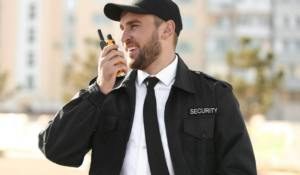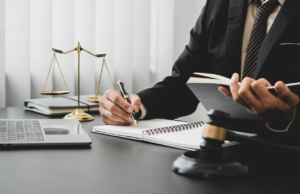Baltimore Private Security oversees various property settings, including commercial properties, gated communities, and events. They provide customer service, enforce rules and regulations, and respond to alarms and disturbances.
Homeowners can deter burglars by installing thick door and window locks. They can also force criminals out of hiding by installing exterior lights and motion detectors.

A security guard’s job is all about protecting property and people. They must constantly be alert for suspicious behavior and respond quickly to prevent or deter trespassing, vandalism, fire, theft, and other potential security breaches. This work is demanding and requires a high level of physical fitness. As such, they must take a few simple steps to stay healthy and safe on the job.
A key safety measure that security guards can take is to familiarize themselves with their working environment. This includes knowing where stairwells, entrances, and exits are located. It’s also helpful to memorize a map of the area so they can identify possible escape routes in case an emergency arises.
Security guards are also responsible for conducting risk assessments. This involves inspecting the premises, identifying potential security risks, and implementing preventive measures to minimize them. This proactive approach ensures that employees and visitors are safe and secure.
Whether they’re receiving guests at a building entrance or conducting a security audit, a well-trained security professional will always be ready to provide customer service and explain security protocols in an easy-to-understand way. This is important because security guards are often the face of the company or building and must be able to communicate clearly in a crisis.
Guards also need to know when they’re in over their heads and require additional support from colleagues. Having proper backup will prevent them from taking unnecessary risks in dangerous situations and can save lives during emergencies. Security companies should have procedures in place to ensure that all guards receive adequate training and are qualified for their role.
For instance, if a guard is armed, they must complete firearms training to get certified and be trained in defensive tactics. It’s also vital that guards have a first aid kit on hand in case they need to care for injured workers or visitors. The kits should include items like bandages, antiseptic wipes, instant cold packs, and more. These tools will allow them to care for minor injuries quickly and effectively, so they can continue to perform their duties without delay.
Security
Whether they are armed or not, security guards have a variety of skills to protect people and property. They are often the first responders to emergencies, but they also work on prevention and deterrence. Their visible presence is a great deterrent to criminal activities, and their training ensures that they are prepared for any threat. However, every guard has limits in terms of strength and stamina. Knowing these limitations allows them to take the appropriate action, such as escalating a situation to law enforcement.
The safety measures that security guards take are essential to the security of businesses, schools and other public areas. This includes ensuring that only authorized individuals gain entry to buildings or events, and searching people before they enter. They also perform a variety of other important tasks, including assessing risks and maintaining accurate incident reports.
Security guards are often trained to handle a range of emergency situations, including medical crises and fire outbreaks. Their initial reaction can make all the difference in keeping an emergency under control until first responders arrive on scene. They also coordinate with authorities in the event of an active shooter or other serious threats.
Armed security guards are equipped with firearms and defensive tools, and they undergo regular maintenance to maintain the condition of their equipment. They also have conflict de-escalation training, which is essential to their ability to quickly and effectively deal with violent situations.
Another key part of a security guard’s job is patrolling. This can be done in a number of ways, from using GPS technology to track their location and logging their patrol route to following well-defined patrol procedures. This is especially critical in high-risk environments, such as nightclubs and jewellery stores.
It is crucial for security officers to follow these rules, as they can help reduce the risk of crime at their workplaces. If they fail to follow the proper procedures, it could lead to dangerous outcomes, like a weapon being smuggled into a facility or a crowd stampede. By following the rules, they can help keep their colleagues, visitors and clients safe.
First Responder
Whether they’re in a parking lot, airport or on the front lines of security at a high-profile location, security guards are often the first to respond when an emergency occurs. With a dedicated watchful eye and rapid response time, security personnel are able to identify and address issues before they escalate. Their detailed recollection and ability to calmly communicate with all parties involved helps to mitigate the situation until authorities arrive on the scene.
Unarmed security guards work in a variety of environments and industries. They monitor cameras, conduct patrols and manage access points at office buildings, hospitals, transportation hubs, shopping centers, event venues and other locations. They also interact with visitors and employees at reception, checking identification, issuing visitor badges, and maintaining logs of entry and departure.
Armed security guards are licensed to carry firearms and are more commonly employed in high-threat settings, such as banks, government buildings and critical infrastructure sites. They undergo additional training in gun safety, threat de-escalation and managing armed incidents.
Remote video monitoring agents are trained to observe in exceptional detail, monitor security camera footage, and identify any activity that is outside of the norm. Their duties can include logging and monitoring activity at multiple sites from a control room, or they may be stationed in the field with a tablet or mobile phone. They must have impeccable observation skills, be able to act quickly and independently, and maintain consistent communication with other guards.
A common role for security guards is to perform routine safety checks on fire exits, emergency equipment, and alarm systems. They’re responsible for ensuring that fire and life safety protocols are followed, and they often assist with evacuations in the event of an emergency. In addition, security guards who work in customer service roles will often escort guests and visitors through facilities, checking identification and providing information and directions.
Mobile guards are the roving faces of security, patrolling facilities and campuses in a vehicle with a visible presence that discourages bad behavior and crime. They’re a critical component of on-site security, working to enforce on-site rules and regulations while keeping up with the ever-changing security needs of each client site. When security incidents or requests for help arise, they’re ready to respond immediately with clear communication and decisive leadership until law enforcement arrive on the scene.
Communication
Security guards rely on communication to carry out their duties efficiently. This includes articulating instructions to the public, resolving conflicts and emergencies, and reporting incidents accurately. Effective communication also fosters trust and rapport with the public, helping guards establish a safe and supportive environment.
Verbal communication is the most critical component of security guard communications. Clear and concise verbal communication reduces the chance of misunderstandings, which can be disastrous in high-stress situations such as during evacuations. Security guards must be able to convey precise instructions while maintaining a calm demeanor, which helps to defuse tension and minimize panic.
Non-verbal cues also play a major role in security guard communications. Body language, facial expressions, and gestures communicate a wide range of emotions to the public. Guards should be aware of their own body language, and adept at reading the non-verbal cues of others to avoid misunderstandings.
Maintaining appropriate eye contact demonstrates attentiveness, while modulating voice pitch and volume can escalate or de-escalate situations. Guards should be able to effectively interact with individuals of all different ages and backgrounds, including those who may be in crisis. Demonstrating active listening and empathy encourages individuals to open up and engage in dialogue.
When an incident occurs, security guards are often required to notify local emergency services such as EMTs and fire departments. They must be able to clearly and succinctly explain the nature of the incident so that responding agency personnel will have the most accurate information on hand upon arrival. In some cases, security guards may have to detain individuals until law enforcement arrives. In these instances, the security guard must be able to clearly and respectfully communicate with the individual to prevent them from escalating the situation or injuring themselves.
Finally, written communication is an important part of security guard communications. Guards are required to write detailed reports after each shift, documenting all aspects of their interactions with the public, including what occurred, how the guard responded, any damage or injuries that were caused, and any other relevant details. The ability to document incidents accurately and efficiently promotes a more thorough understanding of security protocols for future prevention.


